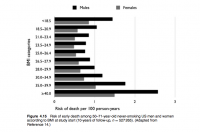In another confirmation of the "obesity paradox", this study found that overweight diabetes patients outlived slim diabetes patients, and had a lower risk of co-morbidities in general.
http://www.reuters.com/article/2015/05/ ... Z220150504
"...Patients with type-2 diabetes who are overweight but not obese outlive diabetics of normal weight, scientists reported on Monday, in another example of the "obesity paradox." Although public health officials issue dire warnings about the consequences of overweight, and employers are pressuring workers to slim down via "wellness programs," the relationship between weight and longevity is paradoxical: Studies show that although obesity increases the risk of developing cardiovascular disease (CVD), overweight patients with CVD live longer than patients of normal weight.
http://www.reuters.com/article/2015/05/ ... Z220150504
"...Patients with type-2 diabetes who are overweight but not obese outlive diabetics of normal weight, scientists reported on Monday, in another example of the "obesity paradox." Although public health officials issue dire warnings about the consequences of overweight, and employers are pressuring workers to slim down via "wellness programs," the relationship between weight and longevity is paradoxical: Studies show that although obesity increases the risk of developing cardiovascular disease (CVD), overweight patients with CVD live longer than patients of normal weight.


